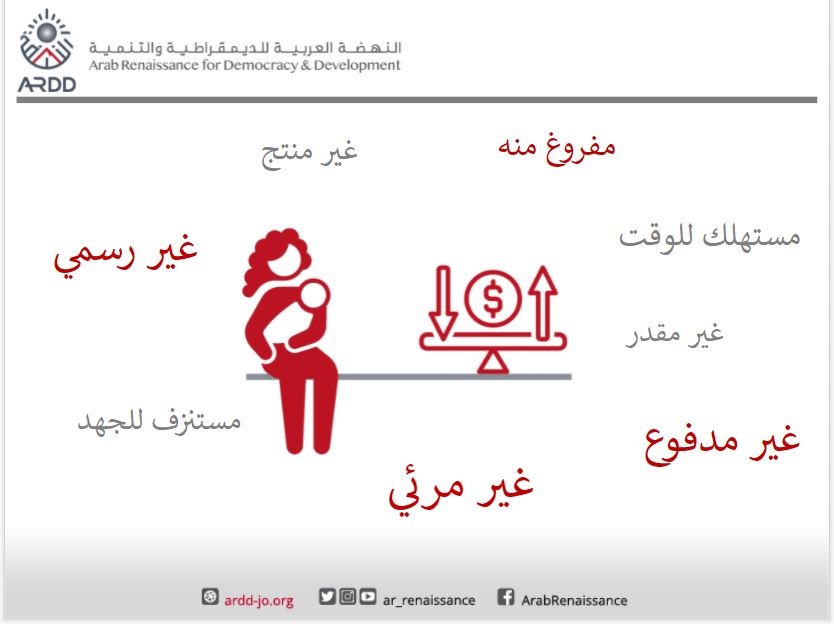Ten women leaders of the Jordan National NGO Forum (JONAF) participated in a digital session held by the Arab Renaissance for Democracy and Development (ARDD) on Thursday 6th May, to tackle the impact of the extended COVID-19 crisis on unpaid women care workers in Jordan.
It was the third webinar ARDD held within the framework of the project “Strengthening the Capacities of Women-Led CSOs in Evidence-Based Advocacy and Women, Peace, and Security (WPS) Agenda”, implemented in partnership with UN Women Jordan and funded by the governments of Canada, Finland, Norway, Spain and the United Kingdom.
The session reviewed the research efforts undertaken by the Nahda Center for Research to document and analyze women’s unpaid care work, within the larger women’s economic empowerment realm. The economic empowerment index still excludes care work from the productive sector, which mainly takes into consideration the market and the ability of women to generate income, ignoring the importance of basic care work to support and protect families and facilitate other family members’ involvement in the market and the overall progress of the economy.
The participants stressed the importance of rethinking care work, taking into consideration the prevailing inequality, the need to promote women’s empowerment, achieve economic development, combat poverty and social exclusion, and the fact that this care work is instrumental to protecting families and their mental health. The session yielded suggestions meant to develop social protection mechanisms that help identify and distribute care work in a way that serves the interest of families and relieves the burden on women, who usually bear the largest part of these burdens.
The participants also presented briefly their experience in working with women for decades; among the most prominent issues raised was the need to raise, as much as possible, the ceiling for adequate psychological and material support for caregivers. One participant suggested estimating the value of unpaid care work and calculating it from the value of a woman’s inheritance, as is the case in some countries. Others came up with the proposal to create paid care jobs to help families with individuals who need special care, thus providing new jobs and reducing the number of unemployed.
Participants also pointed out the challenges that may face the application of such policies, such as the deterioration of the economic situation, the increase in poverty rates and cultural barriers that feed the prevailing societal patterns which require concerted national and local efforts to produce creative solutions to them. There is also need, they said, to work on a cultural shift toward more inclusive and just social practices, which should lead to coming up with a long-term strategy that addresses the burden on care workers in a sustainable manner.
At the end of the session, a sample questionnaire was presented to study the distribution of unpaid care work among women in Jordan and the proposed protection mechanisms from the point of view of women caregivers.


